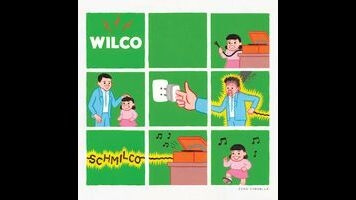Wilco goes quiet

Do you prefer your Wilco wild, wooly, and electric, or soft-spoken and contemplative? The band—perhaps getting a little loopy in its advancing years—has made choosing one side of its personality or the other easy in the last 18 months, first knocking out the noisy, chugging Star Wars and now the downcast, simple Schmilco. Maybe it’s possible to love both equally, but it almost feels like they’re daring people to choose sides: Are you Team Star Wars or Team Schmilco? (Secondary question: Which album title did Wilco spend less time thinking about? Both feel like permission to not take the band too seriously.)
The two albums were actually written and recorded around the same time, though they were consciously divided, in utero, by singer and chief songwriter Jeff Tweedy. He described Star Wars around the time of its release as “a jolt of joy,” and he called Schmilco “joyously negative,” so they’ve got at least something in common. But he also decided to spend a little more time and care on Schmilco, particularly the lyrics, since it’s packed with hushed, personal moments. These types of Wilco songs have been in short supply in recent years, as the six-piece has stretched and pushed itself musically; the danger of putting the quiet ones all in one place is that things could get boring. But Schmilco is Wilco’s most musically simple and emotionally resonant record in a decade, gorgeously naked and efficient.
It’s also surprisingly restrained: Only one song cracks the four-minute mark, and half of them clock in under three. They’re also, for the most part, built around simple acoustic guitar strums and Tweedy’s close-to-the-mic vocal delivery. Album opener “Normal American Kids” features only those two sounds, with just a lightly noodling electric hanging out in the background. Lyrically it jumps right into the autobiographical—Tweedy as lifelong outsider (and stoner) sounds a bit like Arcade Fire’s Win Butler when he deadpans, “I always hated normal American kids.” That one’s a bit on the nose, honestly, but Schmilco goes nowhere but up from there in quality, even while it’s a downer in overall mood.
It’s tempting to read “Cry All Day” as an acknowledgment of Tweedy’s wife’s recent cancer battle (“I’m sick of your affliction”), which might explain why it’s also one of his most slyly powerful vocal deliveries in ages. He goes from a whisper to something more forceful but short of a shout, like he’s getting mad then cooling off, placing a complicated tangle of feelings in a simple sonic house. If any song on Schmilco was heading for an extended, Velvet Underground-style jam, it was this one. But it ends as it begins, peacefully resigned.
“Happiness” goes similar places, despite its title. It’s a sweet ode to Tweedy’s mother—assuming it’s autobiographical—who says he’s great, and whose empty casket, he speculates, could be filled with “roses and Tanqueray.” It’s one of many lines on Schmilco that feel both grave and fantastic. The whole of “Quarters” offers more of that mood, packing the emotional punch of a Raymond Carver short story into just 71 words. And when he’s done with the narrative, the band turns in a lovely little waltz before retreating. It’s done in no time, but like the rest of the quietly wondrous Schmilco, it leaves a mark.